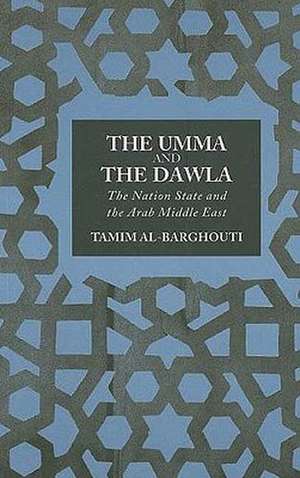The Umma and the Dawla: The Nation-State and the Arab Middle East
Autor Tamim Al-Barghoutien Limba Engleză Hardback – 19 feb 2008
The author argues that these failures have led to the development of an Islamic political theory which is based around the non-territorial concepts of the Umma and Dawla. Each concept is explored in detail and the author explains how crucial they are in explaining the difference between Western policy and the priorities and the identity of the Arab world.
This unique book should be required reading for students of Middle East international relations and Islamic political theory.
This book argues that nationalisms in the Arab Middle East were colonial constructs to legitimize the colonially created nation states. Such states were structured in a manner that guaranteed their behavior as colonies after their independence. There dependence was in fact the condition for their formal independence.
The book contrasts these colonially introduced national identities to the pre colonial Islamic identity the revolved around the concepts of Umma and Dawla. Both concepts have not yet been adequately dealt with in English and have usually been mistranslated into „nation‰ and „state‰ respectively. The Book provides a thorough explanation of these concepts by studying canonical Sunni and Shiite Islamic texts of political theory and jurisprudence. The Book also shows that understanding such concepts might explain how public opinion is formed in the Middle East and how Arab governments gain and loose legitimacy.
Finally the book traces the local elites‚ failed attempts to reconcile the colonially introduced identity that revolves around the colonially created nation state and the native culture that sets political allegiance in the whole Muslim community. Such a failure allowed the Dawla, a non-territorial, non-sovereign form of organization whose allegiance lies with the whole Muslim Umma, to reemerge as a means of social, political in sometimes military, form of organization, thus the variety of non state Islamic actors throughout the region.
This unique book should be required reading for students of Middle East international relations and Islamic political theory.
Preț: 531.53 lei
Preț vechi: 656.21 lei
-19% Nou
Puncte Express: 797
Preț estimativ în valută:
101.72€ • 105.81$ • 83.98£
101.72€ • 105.81$ • 83.98£
Carte indisponibilă temporar
Doresc să fiu notificat când acest titlu va fi disponibil:
Se trimite...
Preluare comenzi: 021 569.72.76
Specificații
ISBN-13: 9780745327716
ISBN-10: 0745327710
Pagini: 256
Ilustrații: 2 figures
Dimensiuni: 135 x 215 x 20 mm
Greutate: 0.41 kg
Ediția:New.
Editura: PLUTO PRESS
Colecția Pluto Press
ISBN-10: 0745327710
Pagini: 256
Ilustrații: 2 figures
Dimensiuni: 135 x 215 x 20 mm
Greutate: 0.41 kg
Ediția:New.
Editura: PLUTO PRESS
Colecția Pluto Press
Cuprins
Preface
Introduction
1. The Formation of the Canon
2. Definitions
3. The Precious Nothing
4. The Colonial Origins of Egyptian Nationalism
5. Arab Nationalism
Conclusion: A Working Compromise?
References
Index
Introduction
1. The Formation of the Canon
2. Definitions
3. The Precious Nothing
4. The Colonial Origins of Egyptian Nationalism
5. Arab Nationalism
Conclusion: A Working Compromise?
References
Index
